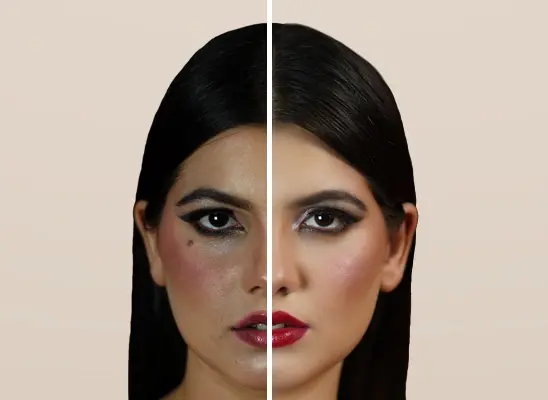Which course is best for makeup artist?
Choosing the best makeup artist course depends on your goals, preferences, and the specific skills you want to develop. Makeup artist courses vary in duration, focus areas, and certifications. Here are some popular types of makeup artist courses:
Professional Makeup Artist Certification Courses
These courses are designed for individuals who want to become certified makeup artists. They cover a wide range of makeup techniques, including bridal makeup, editorial makeup, special effects, and more.
Example: QC Makeup Academy’s Master Makeup Artistry Course
Specialized Makeup Courses
If you have a specific interest or want to specialize in a particular area of makeup artistry, you can find courses that focus on that niche. Examples include courses for bridal makeup, theatrical makeup, or fashion makeup.
Example: London College of Fashion – Short Courses in Makeup
Online Makeup Courses
Online courses offer flexibility and the ability to learn at your own pace. They often include video tutorials, assignments, and feedback from instructors.
Example: Makeup Artist Bootcamp by Makeup Designory (MUD)
Makeup Workshops and Masterclasses:
Workshops and masterclasses provide hands-on experience and allow you to learn from experienced professionals. These short-term courses are often focused on specific skills or trends.
Example: Bobbi Brown Makeup Workshops
Advanced Makeup Artistry Courses
For those who have foundational skills and want to advance their expertise, advanced courses cover more intricate techniques, creative makeup, and portfolio building.
Example: Eva Scrivo Advanced Makeup Artistry Program
Makeup Artistry Diploma Programs:
Diploma programs are more comprehensive and cover a broader range of makeup techniques. They are suitable for individuals who want an in-depth education in makeup artistry.
Example: Vancouver Film School – Makeup Design for Film & Television
Cosmetology Schools
Cosmetology programs cover various aspects of beauty, including hair styling, skincare, and makeup. If you’re interested in a broader beauty education, a cosmetology school might be a good option.
Example: Paul Mitchell Schools – Cosmetology Program
Before choosing a course, consider the following factors:
Accreditation: Check if the course is accredited by a relevant beauty industry association or governing body.
Reviews and Testimonials: Look for reviews from previous students to get an idea of the course quality and outcomes.
Curriculum: Ensure that the course covers the specific skills and techniques you want to learn.
Hands-on Experience: Practical experience is crucial in makeup artistry, so choose a course that provides ample hands-on practice.
Instructor Credentials: Check the credentials and industry experience of the instructors.
Job Placement Assistance: Some courses offer job placement assistance or internships, which can be beneficial for launching your career.
Remember to research multiple options, attend open houses or information sessions if available, and choose a Makeup artist course in Solan that aligns with your career goals in the makeup industry.
What is the best skin care for makeup prep?
Effective skincare is crucial for a flawless makeup application. Properly prepped skin provides a smooth canvas for makeup, helps makeup adhere better, and can contribute to a more radiant and long-lasting finish. Here are steps and tips for skincare as part of makeup preparation:
Cleanse
Start with a gentle cleanser to remove any impurities, oil, and makeup from your skin. Choose a cleanser suitable for your skin type (dry, oily, combination, sensitive).
Exfoliate
Exfoliation helps remove dead skin cells, promoting a smoother complexion. Use a gentle exfoliator 1-2 times per week to avoid over-exfoliation, which can lead to irritation.
Tone:
Apply a toner to balance the skin’s pH levels and prepare it for hydration. Toners can also help remove any remaining traces of cleanser and tighten pores.
Moisturize
Use a moisturizer appropriate for your skin type. Hydrated skin provides a better base for makeup application. Allow the moisturizer to absorb into the skin before proceeding with makeup.
Eye Cream:
If you use an eye cream, apply it before makeup application. Eye cream can help reduce puffiness, dark circles, and provide hydration to the delicate skin around the eyes.
Primer:
Consider using a makeup primer to create a smooth surface for makeup application. Primers can also help makeup last longer and fill in fine lines or pores.
Sunscree
If your moisturizer or primer doesn’t contain SPF, apply a separate sunscreen with at least SPF 30. Sun protection is essential for preventing premature aging and protecting your skin.
Hydrating Mist
A hydrating mist can be spritzed on the face to add extra moisture and create a dewy finish. It’s a refreshing step that can enhance the overall look.
Tips for Makeup Prep
Know Your Skin Type: Choose skincare products that address the specific needs of your skin type (e.g., dry, oily, sensitive).
Patch Test New Products: If you’re trying new skincare products, perform a patch test to ensure they don’t cause irritation or allergic reactions.
Consistency is Key: Establish a consistent skincare routine. Consistency helps improve the overall health and appearance of your skin.
Remove Makeup Thoroughly: At the end of the day, use a gentle makeup remover or cleanser to thoroughly remove makeup before bedtime.
Stay Hydrated: Drinking an adequate amount of water contributes to skin hydration from the inside out.
Consider Professional Advice: If you have specific skin concerns or conditions, consider consulting a dermatologist or skincare professional for personalized recommendations.
Remember that everyone’s skin is unique, so it’s essential to tailor your skincare routine to your individual needs. Experiment with different products and techniques to find what works best for your skin before applying Makeup course in Solan.
Read more article:- Magzinerate


